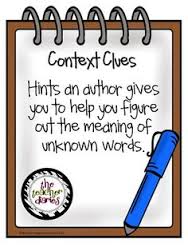What are Context Clues?
“CONTEXT CLUES” are hints found within a sentence, paragraph, or passage that a reader can use to understand the meaning of new or unfamiliar words.
As the word ‘context’ suggests, the meaning of a new word is understood by the context in which it is used in a given sentence.
There are several types of context clues. Given its number on the important ones have been listed below. There are 9 main ones which have been listed below:
- 1. DEFINITION CLUES:
- When a new word is formally defined or it is explained in a sentence (or even two), it is called a definition/explanation clue.
- Example: “The arbitrator, the neutral person chosen to settle the dispute, arrived at her decision.”
- Here, it is understood that an ‘arbitrator’ is a person who plays the role of a mediator.
- 2. EXAMPLE CLUES:
- Sometimes when a reader finds a new word, an example might be found nearby that helps to explain its meaning.
- Example: “Celestial bodies, including the sun, moon, and stars, have fascinated man through the centuries.”
- ‘Celestial’ objects are those in the sky or heavens.
- 3. SYNONYM or RESTATEMENT CLUES:
- Other words with similar meanings with the new word are used in the sentence. The following example is self-explanatory.
- Example: “The slender woman was so thin that her clothes were too big on her.”
- 4. ANTONYM or CONTRAST CLUES:
- A word is clarified by the presentation of another word that holds an opposite meaning, offering a contrast.
- Example: “While Melissa is clumsy and awkward, her sister is quite is elegant.”
- Here, it is understood that ‘elegant’ is the opposite of ‘clumsy and awkward’. Therefore, it means close to classy and graceful.
- 5. MOOD or TONE CLUES:
- The author sets a mood, an emotion, and the meaning of the unknown word must harmonize with the mood.
- Example: “The lugubrious wails of the gypsies matched the dreary whistling of the wind in the all-but-deserted cemetery.”
- ‘Lugubrious’ which means ‘sorrowful’ fits into the mood set by the words ‘wails’, ‘dreary’ and ‘deserted cemetery’.
- 6. ANALYSIS or STRUCTURE CLUES:
- The part of a word can be a direct clue to its meaning. Having knowledge of root words, prefixes and suffixes is very helpful in this case.
- Example: “The story is incredible.”
- The root ‘cred’ means ‘to believe’ and the prefix ‘in’ means ‘not’. Therefore, if a story is ‘incredible’, it is ‘unbelievable’.
- INFERENCE CLUES:
- Word meanings have to be inferred from the context of the given sentence.
- Example: “I’m through with blind dates forever. What a dull evening! I was bored every minute. The conversation was vapid.”
- Here, ‘vapid’ means ‘uninteresting’.
- CAUSE AND EFFECT CLUES:
- The author explains the reason for or the result of the word.
- Example: “She wanted to impress all her dinner guests with the food she served, so she carefully studied the necessary culinary arts.”
- Here, ‘culinary’ means ‘having to do with food’.
Click here for government certifications





9 Comments. Leave new
Systematic work. Keep up the good work. Very Informative.
Very informative.. and well presented too.. Keep it up..
Interesting article
Interesting topic.nicely written
good points and well explained
good one 🙂
Really unique topic 😀
I really read this article due to the title 😀
And this is what i wanted subtopic , info and an example to show 😀
Liked the way you presented 😀
nice clues 😀
informative and itneresting